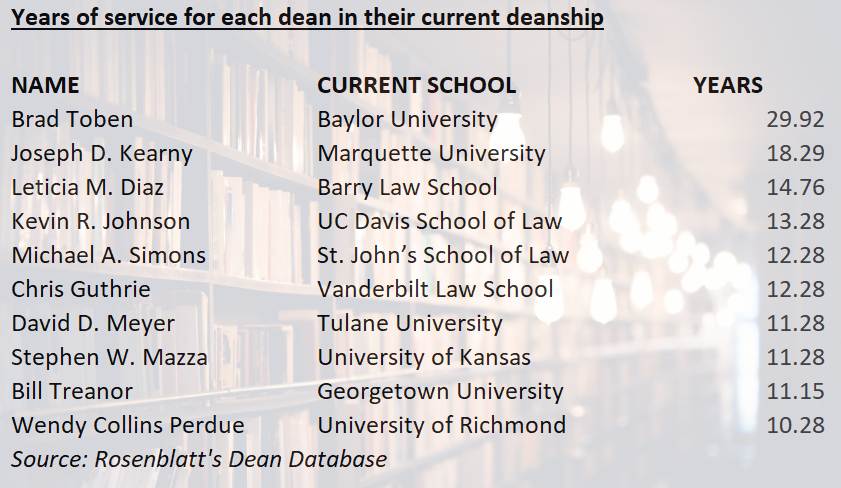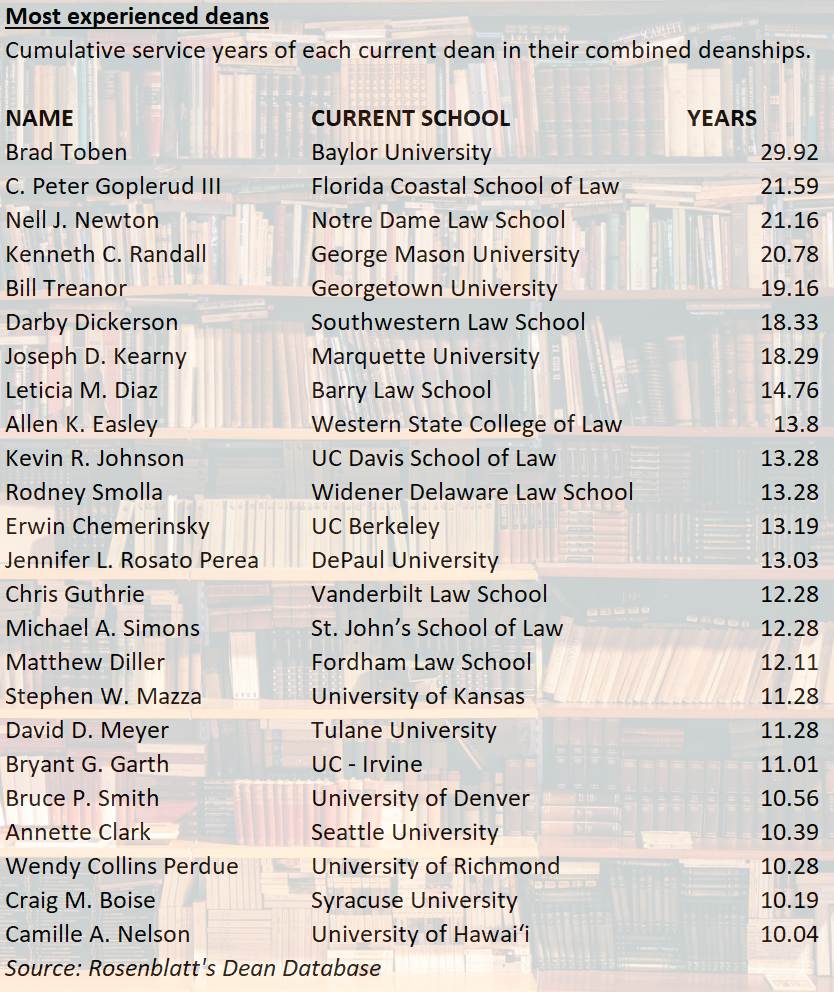Brad Toben, dean of Baylor School of Law, is an exception with 29 years
If you think the average NFL career is short — lasting only 3.3 years — there’s another profession that rivals it when it comes to brevity.
That would be dean of a law school. The average tenure of a law dean is 4.1 years. And there’s not much chance of a dean landing an endorsement deal for, say, Campbell’s Chunky Soup either . . .
It’s apparently a U-Haul moment in the waiting.
The tenure tally comes from Rosenblatt’s Deans Database, compiled by Jim Rosenblatt, dean emeritus of Mississippi College School of Law. He served as dean 11 years — from 2003 to 2014 — nearly three times the average.
He’s not quite in the Tom Brady category when it comes to career length, but who is?
Oh, here’s one. Brad Toben, dean of Baylor University School of Law, has served for nearly 30 years. That’s far and away No. 1. Joseph Kearney, dean of Marquette University Law School, trails at 18 years.
So, what gives with these apparently short average tenures?
You can’t blame torn ACLs.
You can blame the pressures of the job, said Erwin Chemerinsky, president-elect of the Association of American Law Schools and dean of University of California, Berkeley, School of Law.
And this past year, the pandemic made a tough job even tougher, he said.
“There are so many constituencies to be served: students, faculty, staff, alumni, central administration,” he said. “There are all of the pressures created by the budget, by rankings, by the competition for students and faculty.”
Chemerinsky has been at UC Berkeley School of Law for five years. Before that, he led University of California, Irvine School of Law for nine years. He ranks 12th among all active deans for length of service.
“It is a great opportunity to make a difference,” he said of his position.
The short average tenure is something he hopes the association will look into, he said.
Some deans don’t make it anywhere near the four-year average.

When Scott Brown resigned as dean of New England Law in Boston earlier this year, he was just eight months into the gig. The former Republican U.S. Senator from Massachusetts told the school’s board of trustees that his vision didn’t match theirs, according to Reuters.
However, that kind of brief stint is just as much of a rarity as a long stay. Rosenblatt, using data from 400 past deans, found the average tenure to be just over 5 years. Today’s average, as noted, is four years, but deans are still serving and will add to their tenure, he said.
“Being a law dean is hard work with a number of challenges and with many constituencies to which they are accountable and must satisfy,” he said. “Thus, it is not unexpected that law deans would leave after 4-7 years.”
His tenure was unusual in its length. There are only 11 current deans who have served for more than 10 years.
“Not everyone aspires to be a law dean,” he said. Many faculty members are content to continue their teaching, scholarship, and service as a faculty member. Leadership is hard and demanding. One must be excited about the challenges of leadership, derive satisfaction from setting and reaching goals, have abundant energy and a strong work ethic, possess a thick skin, and desire to serve the institution to seek a law school deanship.”
And therefore it should not be shocking that some long-time deans are currently calling it quits. It just continues the pattern.
Annette Clark, who has been dean of Seattle University School of Law since 2013, and Ward Farnsworth, dean at University of Texas School of Law since 2012, will both step down at the end of this academic year.
Nancy Staudt left her post as dean of Washington University School of Law in St. Louis on Oct. 1 to take a leadership position at Rand Corp.’s Pardee Graduate School of public policy. She had been dean at Washington University since 2014.
Well, at least all those deans beat the four-year average. Being a dean is a high-pressure job, no question, and full of landmines.

Mary Lu Bilek, former dean of City University of New York School of Law, stepped down earlier this year after she referred to herself as “slaveholder.” She was in the middle of a hiring controversy. She had proposed that a White job candidate take a tenured admissions position, even though the candidate didn’t have as much service time as others on the faculty, including people of color.
In an email, Bilek wrote that she had decided to retire “because the work it would take to repair the trust necessary to lead the Law School is a burden I don’t want to impose on the faculty or the community.”
So what’s the secret to longevity?
Toben told Texas Monthly magazine a few years back:
“It’s not a matter of length of years; it’s a matter of can you make a contribution that moves the institution forward. I hope to have a blessing of doing that a lot more years.”
And that would be a rarity, apparently.

